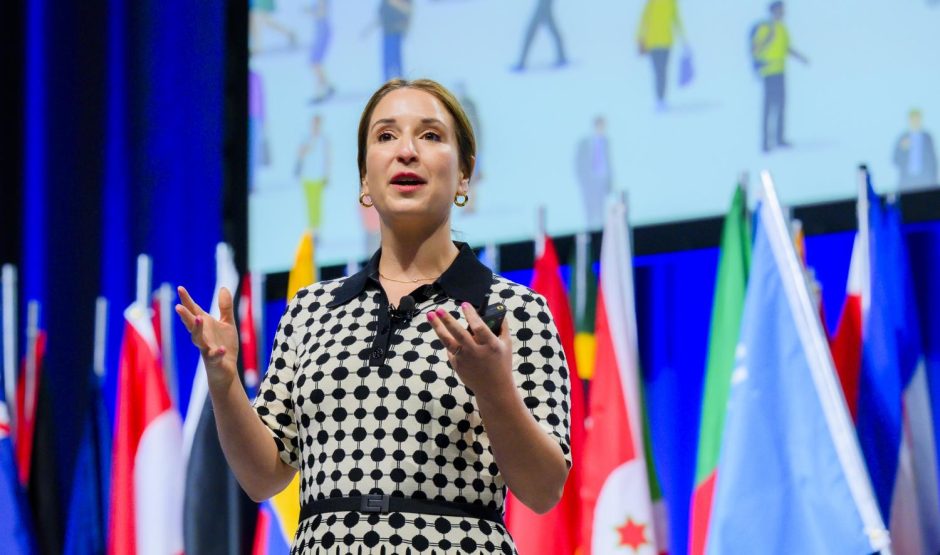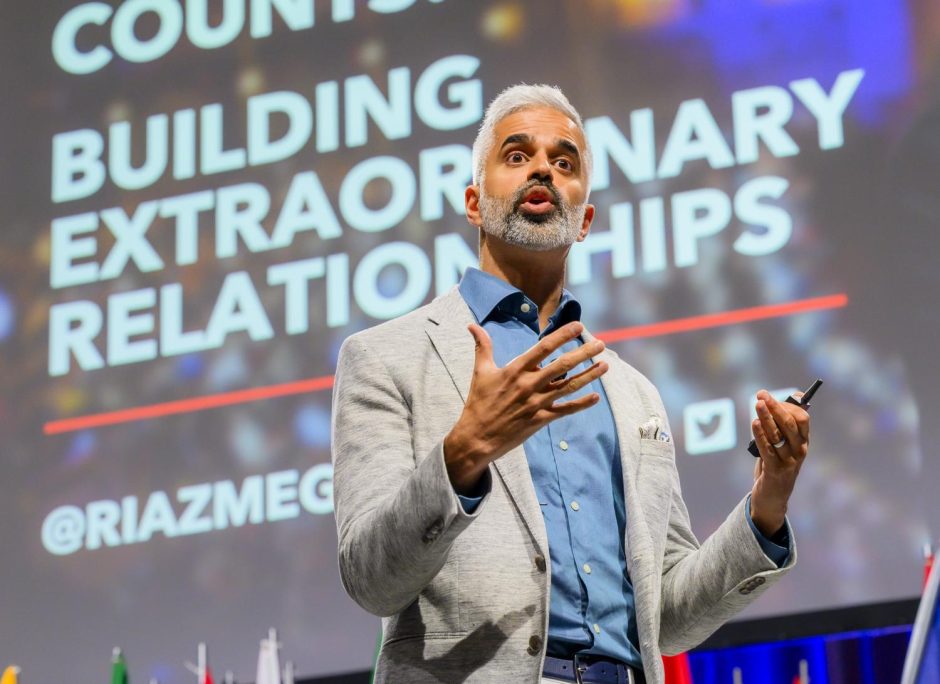The World Council of Credit Union Conference brought over 3,000 attendees from more than 60 countries to Vancouver on 23-26 July, for a packed event with 100 speakers and 43 keynote presentations or breakout sessions.
Co-hosted by the World Council of Credit Unions (Woccu) and the Canadian Credit Union Association (CCUA), it included presentations from Ukraine, discussion of ways to attract generation Z, and the climate crisis.
The event kicked off with a flag parade and musical performances by members of Canada’s First Nations, before a welcome from Woccu chair Diana Dykstra, who encouraged credit union professionals to embrace change and remain open to new possibilities.
“It is in the spirit of adapting and becoming resilient that we gather this week to connect and learn from one another,” said Dykstra. “You will meet colleagues and friends from every corner of the globe and learn how our peers are addressing credit union issues like expanding membership, developing shared solutions, delivering better services through digital platforms and climate-smart, resilient solutions.”
Woccu also announced its 2023 Distinguished Service Award winners: Oleg Lebedko, CEO of Ukrainian Federal Credit Union (New York, USA), and Brian Branch, former Woccu president and CEO. A volunteer for the Woccu Credit for Agriculture Producers’ (CAP) Project in Ukraine, Lebedko has been travelling to Ukraine since 2017 to help create a strategic plan for the All-Ukrainian Credit Union Association (AUCUA).
“While this award is recognition of my individual achievements,” he said, “I firmly believe it is a reflection of the extraordinary work carried out by many credit unions worldwide and, specifically, by the activists of the credit unions in Ukraine and Ukrainian diaspora credit unions in the US and Canada, representatives of which are present here today.
“I want to dedicate this award to the brave and courageous Ukrainians, including many credit union employees and members, who have been fighting for the sovereignty and freedom
of Ukraine.”
On the second day of the conference Woccu president and CEO, Elissa McCarter LaBorde, delivered a state of the movement address on the resilience of credit unions.
“These challenges test our resolve,” she said, “but they also offer us an opportunity to meet those challenges and show our commitment to a shared purpose of putting people over profit. That is the credit union way.”
She highlighted the role of credit unions in helping members stay resilient during conflicts, natural disasters and during an upswing of migration in Latin America.
“In one example, in Peru and Ecuador, where World Council has been working for almost five years now, credit unions are part of a national ecosystem, working with government, working with tech companies and municipalities to try to advance the economic inclusion of the most vulnerable citizens in those communities –working with migrants, especially with women, who have been forced to flee their home countries. And this is a remarkable programme, because it shows that even in the face of disruption, credit unions are part of bridging that gap and driving inclusive growth, even with those who are very hard to reach and often left behind.”
Regulation was also on the agenda, with Woccu assistant general counsel of international advocacy, Panya Monford, advising attendees to get ready for new International Sustainability Standards Board (ISSB) reporting requirements in 2024. “The purpose of IFRS S1 and S2 is to create common language for sustainability and climate-related disclosures,” she said. “They want to create a baseline everyone can follow.”
Andrew Price, Woccu senior vice president of international advocacy and general counsel, said credit unions should be able to provide disclosures based on information that is reasonably available to them, which will not require them to pay a consultant to gather outside data.
“I think that’s the biggest reason credit unions are going to be able to be compliant,” said Price, who advocated for the inclusion of this proportional language.
A breakout session at the conference featured a presentation from Volodymyr Sydorovskyy, CEO of Credit Union Anisia, in Lviv, Ukraine, who talked about the resilience of his members.
“The first year of war, 2022, was a shock,” he said. “There was psychological, military and general uncertainty, so of course people moved a lot, they didn’t want to take loans and they wanted to withdraw their deposits. But, as we see the trend in 2023, the demand is growing for loans, especially small and medium enterprises. They want to resume their operations, especially in the agricultural sector.”
Credit Union Anisia is one of the 24 credit unions that benefit from the Usaid/Woccu Credit for Agriculture Producers (CAP) Project, which works to expand access to agricultural loans for their members.
“When we compare them (partner credit unions) to the entire 123 credit unions across the sector, we are performing better,” said Ewa Sierzynska, chief of party for the CAP Project. “Our losses are smaller, our portfolios have better quality and the drop in assets, loans and deposits are much smaller than on average.”
Keynote speakers included Alison Burns and James Taylor, from Ethical Futurists, who advised credit unions to embrace technology to get ahead of future challenges.

In another keynote address, writer and researcher Kim Lear gave advice on how to building ‘standout experiences’ for every generation. Generation Z workers have close relationships with their parents, she said, and often take their advice when making career choices. Being rooted in their local communities could give credit unions an advantage when it comes to attracting gen Z candidates, she added.
The conference also saw the launch of a new Climate Influencers Network. An inaugural event, attended by 20 credit union leaders from six continents, discussed the types climate resilience issues that should be priorities for the credit union movement.

On the final day, delegates heard from broadcaster and author Riaz Meghji, who argued that credit unions can “out care” their competition. “If our goal is to build extraordinary credit union-member relationships, human connection isn’t an option – it is a necessity,” he said, explaining that meaningful human interactions can put credit unions ahead of their competitors.
“If we lead with connection, each and every one of you in this room can win with one important strategy – you will be able to ‘out care’ your competition,” said Meghji.
Next year’s conference will be held in Boston, Massachusetts, USA.
This article was amended to correct the conference date.